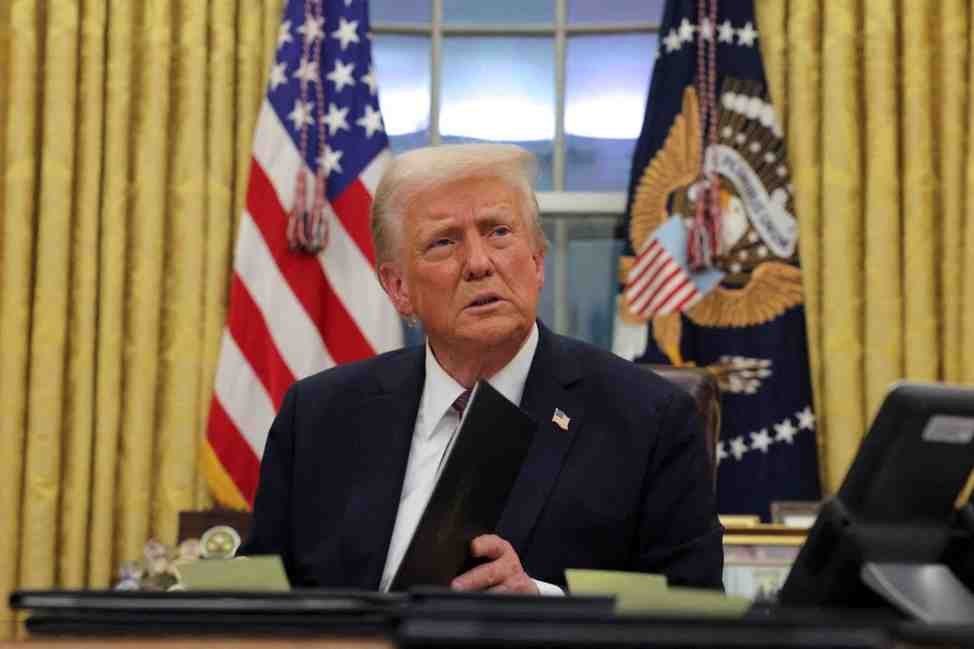The U.S. President Donald Trump indicated on Sunday that he may meet with Russian President Vladimir Putin “very soon” to discuss the ongoing conflict in Ukraine. Trump expressed his belief that Putin is interested in halting the fighting, a statement that comes as the war approaches its third anniversary.
Speaking to reporters, Trump noted, “No time set, but it could be very soon.” His comments followed remarks from the U.S. Secretary of State Marco Rubio, who tempered expectations for high-level discussions in Riyadh aimed at resolving the war. Rubio is currently leading a U.S. delegation to Saudi Arabia, where talks with Russian officials are scheduled to take place.
Trump revealed that his team has engaged in extensive discussions with Russian representatives, including his Middle East envoy, Steve Witkoff, who recently spent approximately three hours in conversation with Putin. “I think he wants to stop fighting,” Trump stated, referring to the Russian leader.
When asked whether he believes Putin aims to seize control of all of Ukraine, Trump responded, “That was my question to him. If he’s going to go on… that would have caused me a big problem.”
He reiterated his belief that both Putin and Ukrainian President Volodymyr Zelenskyy are eager to bring the conflict to a close. “I think he wants to end it, and they want to end it fast. Both of them,” Trump added, emphasizing that Zelenskyy shares this desire.
However, Zelenskyy expressed concerns on the same day, suggesting that Russia might be preparing to “wage war” against a weakened NATO if U.S. support for the alliance diminishes under a potential Trump administration. In response, Trump dismissed Zelenskyy’s comments, stating he was “not even a little bit” worried.
Trump has previously claimed that he could resolve the Ukraine conflict in a single day if re-elected, but Rubio cautioned that achieving peace would be a complex process. “A process towards peace is not a one-meeting thing,” he told CBS at the Munich Security Conference.
As the U.S. delegation prepares for talks in Riyadh, the participation of Ukraine remains uncertain. Rubio acknowledged that the details of the negotiations are still being finalized, stating, “Nothing’s been finalized yet.” The aim is to initiate a broader dialogue that would include Ukraine and work towards ending the war.
Witkoff and U.S. National Security Adviser Michael Waltz are also expected to attend the discussions. Trump and Putin had a lengthy phone conversation on Wednesday, during which they agreed to commence ceasefire negotiations immediately.
This unexpected call raised eyebrows among NATO allies and Ukraine, with Zelenskyy insisting that “no decisions about Ukraine should be made without Ukraine.”
Rubio, after speaking with Russian Foreign Minister Sergei Lavrov, remarked, “Right now there is no process. One phone call does not make peace.” He emphasized the importance of the upcoming weeks in determining whether Putin is genuinely committed to peace.
In an interview with NBC on Sunday, Zelenskyy expressed skepticism about trusting Putin as a negotiating partner. “I don’t think in geopolitics, anyone should trust anyone,” Rubio echoed, highlighting the cautious approach that many leaders are taking in light of the ongoing conflict.
As the situation continues to evolve, the international community watches closely to see if these discussions will lead to a meaningful resolution to the war in Ukraine.
The complexities of the geopolitical landscape, combined with the differing perspectives of the involved parties, suggest that achieving lasting peace will require sustained effort and commitment from all sides.








